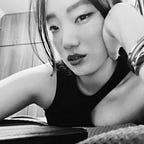The Assassin (2015) — Hou Hsiao-Hsien
An unconventional wuxia film that makes one think about the reasoning behind good cinema: the eyes or the mind?
It opens in black and white, only allowing color to tint the screen after its first seconds. I immediately remembered Zhang Yimou’s early “The Road Home”, also identifying the past and present with b&w and vibrant colors of the Chinese landscape, clothes and food. But apart from the stylistics chosen to play with time, Hou Hsiao-Hsien gives a whole other performance as director of a wuxia film. His camera, like the other films he’d done before, influenced by Japanese filmmakers such as Ozu, is slow and, although excited about the colored cinematography that a countryside Chinese landscape can offer, it went far from the saturating choices Wong Kar-Wai made with his own wuxia “Ashes of Time”. Its slow pace was actually surprising, since one does not associates kung fu productions with an unhurried camera. That is easily perceived when one compares “The Assassin” with Yimou’s “House of the Flying Daggers”, “Hero” or “The Curse of The Golden Flower”, which have fleeting fighting scenes, with jumping actors and strong, scintillating green and gold. Meaning, this is not a conventional martial arts work, but it is indeed a work of art to be esteemed by those interested in cinema as the ultimate visual form of expression. Even if the story is unclear and might make a viewer, such as myself, want to rewatch it for answers, the director managed to make the characters feelings boil through the surface of the screen with his various visual methods and general cinematography — done spectacularly by Mark Lee Ping Bing. “The Assassin” is a delight for the eyes, although a little bit hard for the mind to take in, even more so if one is expecting kung fu furor.
Nevertheless, the story is ultimately a wuxia story. In 9th century China, a woman, Nie Yinniang, played by the very profitable face of Shu Qi, becomes an assassin after being abandoned by her family with a princess turned nun, Jiaxin (Fang-Yi She), who trains her into the martial arts so she can eliminate corrupt governors. Yet, Yinniang fails to accomplish one of her missions when showing mercy to her target after seeing him play with his son. As punishment, Jiaxin sends her on a most challenging assignment: murder Tian Ji’an (Chang Chen), the governor of the Weibo Province and the cousin she was once close to and almost promised to marry. Once more, Yinniang shows signs of mercy and the story takes a more suspenseful turn as the spectator is unsure of Yinniang fidelity to her master or to herself and her own past. But most of the suspense comes not from the plot or the dialogues themselves but from the way Hou Hsiao-Hsien created mystery environments with foggy scenarios and long and slow closes on his performers expressions.
Although based on the short story “Nie Yinniang”, by the classical Tang-dinasty Chinese writer Pei Xing , the movie gives the feminine roles much more prominence than the literary work, in which Yinniang is constantly trying to have her way in the men’s world, serving as a powerful tool for their ambitions. On the cinema screen, however, Yinniang’s personal contradictions and feelings are the fuel that moves the plot, while the male characters figure as resultant of her choices. The same goes for the other female characters, like the nun or the governor’s mistress, whose in-depths seem to shout louder than those of the male characters, who actually scream and throw things around. I believe Hou’s filmmaking style works better with characters who express themselves with a single look or move rather than with big gestures, and that’s the reason for the gender antagonism in “The Assassin”.
Another interesting sociological aspect of this film is the director’s view on China. Although born in mainland China, Hou Hsiao-Hsien’s family fled the Chinese Civil War in the 40s shortly after Hou’s birth, moving to Taiwan, where he was raised and the place where he started making films. In a very interesting interview, he acknowledges his biased view on China and its politics, giving as example the time when he had to stop editing his most famous picture “City of Sadness” because, at that exact moment, the Tiananmen Square massacre was being aired live on the TV. But as we watch “The Assassin”, despite the presence of the corrupt governors, the given impression of China is of a dreamland. In the same interview, Hou confesses he makes movies not for an audience but solely for himself. As a consequence, it’s only fair to imagine this was his attempt to create an image of his homeland’s past as one of pure beauty; a nature kind of beauty. I understand the way he portraits China as I often think of Japan that way, even though having been there only a few times. It’s comforting to have an association with an imagined good place, better than the actual reality. However, precisely because of his bias, he’s already stated he’s in no position of making films about actual Chinese people, distancing himself of what he doesn’t know for a fact.
In the end, Hou Hsiao-Hsien’s films are very realistic. Even in this case, “The Assassin” must’ve been the truest wuxia film I’ve ever watched, softening up even the flying fighting scenes to something more physically plausible. It’s a gorgeous worth-watching film that will definitely leave an impression on anyone who dares watching it.
